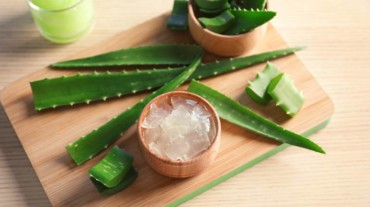
Greying, hair thinning, excess hair fall, dry and damaged hair, and baldness. Whenever we encounter any of these hair problems, we usually seek chemical products in the hope that they can restore our hair health. But experts caution against using these as they can do more harm than good. Instead, you should look for natural solutions. Why? Well, because they come with the promise of causing no side effects.
When it comes to natural ingredients, Ayurveda has many secrets that can help curb your hair problems. And if you are someone who has always dreamt of long and healthy tresses, the best way to achieve it is by using Ayurvedic herbs.
If your aim is to reduce hair fall and strengthen your tresses to give way to improve growth, enhance volume and more shine, you can simply walk to the kitchen in the search for fenugreek seeds or Methi. It is an Ayurvedic ingredient that is beneficial for treating hair thinning, dandruff, and dry scalp. Its incorporation in your hair care routine quickly reverses damaged and dry hair conditions.

In fact, according to a research study of 2006, fenugreek seed extract improved hair volume among a section of people.
Bhringraj is an ancient Ayurvedic secret and is also known as the king of herbs. Its oil is rich in iron, magnesium, Vitamin E, polypeptides, and Vitamin D. That’s why bhringraj is one of the most effective Ayurvedic herbs to treat hair loss. Various studies published in the journal Archives of Dermatological Research, BioMed Research International and, International Journal of PharmTech Research have also proved this claim.
Mix bhringraj oil with castor oil and massage your scalp in a circular motion and your hair problems will go away in no time.
We know how good Amla can be for physical health. But did you know that it can work like magic on your hair too? You would be surprised to know that according to a study published in the Journal of Pakistan Medical Association, topical use of this wonderful gift from mother nature can boost hair growth — all thanks to the presence of Vitamin E. If you are someone who is struggling with dandruff, try out this remedy. It’s going to help you too!

Lavender needs no introduction because it has been a rage due to its wonderful aroma. Not only is the smell wonderful but it has additional benefits. It has therapeutic properties that relieve stress and stimulate hair growth. It has antimicrobial properties that prevent bacteria and fungi from growing on your scalp. This means that using lavender oil can help reduce itchiness, and dryness on your scalp and fight dandruff and head lice. So say goodbye to all embarrassment with lavender oil.
Aloe vera is one of the most versatile ingredients that is used for many beauty purposes. This wonder plant can calm an itchy scalp, boost hair growth, and even repair damaged tresses. According to the Indian Journal of Dermatology, aloe vera is rich in vitamins A, C, E, B12 and packs a solid punch of minerals well. So, the gel extracted from this plant helps in treating several hair problems.

In fact, the International Journal of PharmTech Research states that aloe vera gel has been used traditionally for hair loss, and for improvement in hair growth after alopecia.
Select Topics of your interest and let us customize your feed.
PERSONALISE NOWRosemary leaves promote hair growth as it contains ursolic acid, which is believed to boost blood circulation, ensuring that oxygen and nutrients reach the hair follicles. Due to its high antioxidants content, greying and falling of hair is also reduced by rosemary. In addition, rosemary has anti-inflammatory and antimicrobial effects which means this can keep dandruff and scalp irritation at bay.
Ladies, these Ayurvedic herbs are a huge saviour for your hair problems. So go natural for hair care and see the magic!
Get Latest Updates on Beauty, Hair Care, Natural Cures, Skin Care